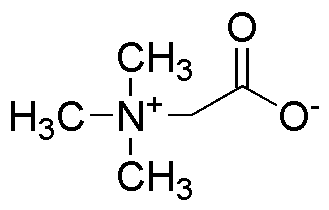Betaine, anhydrous is widely utilized in research focused on:
- Animal Nutrition: Commonly used as a feed additive to enhance growth performance and improve feed efficiency in livestock and poultry, leading to healthier animals and increased production.
- Cosmetics and Personal Care: Incorporated into skincare and haircare products for its moisturizing properties, helping to improve skin hydration and reduce irritation, making it ideal for sensitive skin formulations.
- Pharmaceuticals: Explored for its potential benefits in liver health and metabolic disorders, providing a natural alternative for supporting liver function and reducing homocysteine levels.
- Food Industry: Used as a flavor enhancer and a natural preservative, contributing to improved taste and shelf-life of various food products without the use of synthetic additives.
- Biotechnology: Applied in cell culture media to support the growth of various cell types, enhancing the viability and productivity of cells in research and therapeutic applications.
General Information
Properties
Safety and Regulations
Applications
Betaine, anhydrous is widely utilized in research focused on:
- Animal Nutrition: Commonly used as a feed additive to enhance growth performance and improve feed efficiency in livestock and poultry, leading to healthier animals and increased production.
- Cosmetics and Personal Care: Incorporated into skincare and haircare products for its moisturizing properties, helping to improve skin hydration and reduce irritation, making it ideal for sensitive skin formulations.
- Pharmaceuticals: Explored for its potential benefits in liver health and metabolic disorders, providing a natural alternative for supporting liver function and reducing homocysteine levels.
- Food Industry: Used as a flavor enhancer and a natural preservative, contributing to improved taste and shelf-life of various food products without the use of synthetic additives.
- Biotechnology: Applied in cell culture media to support the growth of various cell types, enhancing the viability and productivity of cells in research and therapeutic applications.
Documents
Safety Data Sheets (SDS)
The SDS provides comprehensive safety information on handling, storage, and disposal of the product.
Product Specification (PS)
The PS provides a comprehensive breakdown of the product’s properties, including chemical composition, physical state, purity, and storage requirements. It also details acceptable quality ranges and the product's intended applications.
Certificates of Analysis (COA)
Search for Certificates of Analysis (COA) by entering the products Lot Number. Lot and Batch Numbers can be found on a product’s label following the words ‘Lot’ or ‘Batch’.
*Catalog Number
*Lot Number
Certificates Of Origin (COO)
This COO confirms the country where the product was manufactured, and also details the materials and components used in it and whether it is derived from natural, synthetic, or other specific sources. This certificate may be required for customs, trade, and regulatory compliance.
*Catalog Number
*Lot Number
Safety Data Sheets (SDS)
The SDS provides comprehensive safety information on handling, storage, and disposal of the product.
DownloadProduct Specification (PS)
The PS provides a comprehensive breakdown of the product’s properties, including chemical composition, physical state, purity, and storage requirements. It also details acceptable quality ranges and the product's intended applications.
DownloadCertificates of Analysis (COA)
Search for Certificates of Analysis (COA) by entering the products Lot Number. Lot and Batch Numbers can be found on a product’s label following the words ‘Lot’ or ‘Batch’.
*Catalog Number
*Lot Number
Certificates Of Origin (COO)
This COO confirms the country where the product was manufactured, and also details the materials and components used in it and whether it is derived from natural, synthetic, or other specific sources. This certificate may be required for customs, trade, and regulatory compliance.


